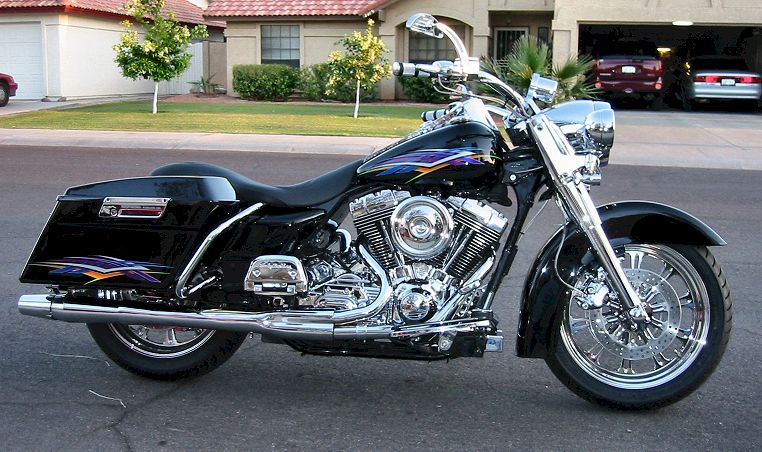 |
FReeper Motorcycle Hooligan |
| FR motorcycle-related posts | |
| Send FReepmail if you want on/off FMH list | |
Whoops. Meant to include a photo of wrenchin', not wenchin'.
Bad, Marty! BAAAD!
Posted on 09/29/2003 10:48:24 AM PDT by Willie Green
For education and discussion only. Not for commercial use.
PHOENIX - After losing his job at the Boeing Co. in February, Curt Gnagy could have followed the out-of-work pack and fired off a stack of resumes.
Instead, the 49-year-old tooling engineer left his wife and stepsons in Washington state and headed for an obscure office complex in Phoenix.
Gnagy enrolled at the Motorcycle Mechanics Institute, an internationally known trade school that graduates a few thousand entry-level motorcycle technicians a year. The 30-year-old school, always popular with high school grads and 20-somethings, has seen a surge in interest from laid-off manufacturing workers from around the country.
Foreign competition
Many lost their jobs because of foreign competition and received government grants to pay for retraining. The percentage of financial-aid students on such Trade Adjustment Assistance grants has increased from about 45 percent a year ago to more than 75 percent today, said Andrea Quattrocchi, agency admissions representative.
"I think a lot of it has to do with the economy," she said.
Using the generous grants, laid-off workers like Gnagy decided to follow their passion and ride the boom in the motorcycle industry.
"I said, 'What do I want to be when I grow up?' I want to be a Harley mechanic," said Gnagy, who was with Boeing for 22 years.
Joan DeWyer, another Boeing transplant, decided it was time for a radical work change. The ponytailed 41-year-old single mother, who rides a Harley Sportster, spent 18 years at the airplane manufacturer, mostly in administrative work. She was a program manager before getting laid off in September 2002. She started classes at the institute two months later, also on a full-tuition grant.
A learning opportunity
"You have to do something," she said. "Here's an opportunity to go learn something that maybe you want to learn."
Gnagy, who took his first ride at age 7 on the luggage rack of a Harley-Davidson 45 left over from World War II, did his homework long before the pink slip was issued.
He devoured publicly traded Harley-Davidson's financial reports to size up the company and the industry's prospects.
"Looking at their planned expansion, they're going to need a lot more mechanics for quite a while," he said.
He zeroed in on the Phoenix institute, owned by Universal Technical Institute, because of its reputation.
"If you want to be a Harley mechanic, this is the place," he said.
Andreanne DePape, operations manager for the Hacienda Harley dealership in north Scottsdale, said she has been pleased with the quality of the technicians coming out of the motorcycle institute and the custom training it offers for existing Harley technicians.
Some of Hacienda Harley's porters - mechanics' assistants who clean bikes, among other duties - go to the institute while working part time at the dealership.
"They're very good," she said. "What I like is they're at our back door. I don't have to send technicians flying around the country."
The institute's program is intense - classes run five days a week for a year to a year and a half, depending on the elective - and pricey. Tuition starts at $18,000. Students choose which brand of bike they want to specialize in. In addition to Harley, the institute offers Honda, Yamaha, Suzuki and Kawasaki training.
The institute says it is the only school sponsored or endorsed by the five major motorcycle manufacturers. Its main competitor is AMI Inc., in Daytona Beach, Fla.
The manufacturers keep the Phoenix institute and its recently expanded 100,000-square-foot facility stocked with bikes, accessories and training materials for students in exchange for a steady supply of trained mechanics.
"Training is extremely expensive," said Terry Emig, industry relations manager for the institute. "Manufacturers today spend more time in their sales and marketing efforts."
There is big demand for training, experts say, because today's motorcycles are so sophisticated and expensive.
Rare is the motorcycle hobbyist or backyard mechanic these days who can walk into a dealership and start work in the service bay.
"You go back even 10 years and the mainstay of the motorcycle was carburation," said Tom Roderick, features editor for trade magazine Dealernews. "Nowadays, for the majority, it's fuel injection."
Even though Gnagy's tuition is paid, he's draining his 401(k) to pay the mortgage in Washington. His wife pays the other bills. Unemployment checks pay the rent in Phoenix.
With starting salaries for new mechanics about $12 to $15 an hour in Washington (and just $8 to $12 on average), he knows it will be a while, if ever, before he's back to his Boeing pay of $29 an hour. He has big plans down the line, though.
"I really intend to open a shop ... to take advantage of all the yuppies in our area."
 |
FReeper Motorcycle Hooligan |
| FR motorcycle-related posts | |
| Send FReepmail if you want on/off FMH list | |
Whoops. Meant to include a photo of wrenchin', not wenchin'.
Bad, Marty! BAAAD!
Many of 'em are the same guys taking the retraining course.
He's talking about "RUBS" Rich Urban Bikers...Any of you watch the bike building challenge on one of the discovery channels?...which do you prefer the old school or new designs?

-archy-/-

Disclaimer: Opinions posted on Free Republic are those of the individual posters and do not necessarily represent the opinion of Free Republic or its management. All materials posted herein are protected by copyright law and the exemption for fair use of copyrighted works.